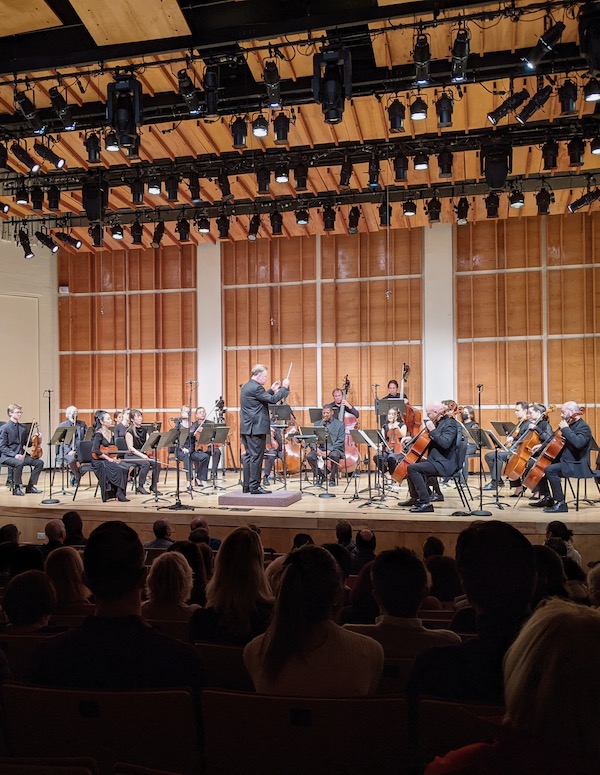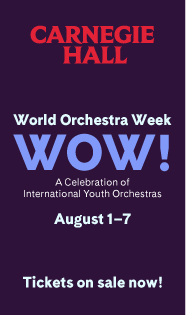Modus Operandi strings deliver absorbing performance at Merkin Hall

The Strings of the Modus Operandi Orchestra made their Merkin Hall debut Wednesday evening with a program that was profound, absorbing, and an immensely satisfying musical experience.
Founded by conductor Justin Bischof, MOO has ventured into New York City on occasion—including a concert at Carnegie Hall’s Weill Recital Hall in 2007. The ensemble has mostly made its mark in Westchester County, but is currently orchestra-in-residence at St. Mary’s Church in Queens. MOO hopes to grow its musical footprint in NYC and with music making of the caliber exhibited at this concert, the orchestra and its conductor made a major step in that direction.
Two works reflecting on the destruction of Germany during the final months of World War II were at the core of the program, Shostakovich’s Chamber Symphony and Strauss’ Metamorphosen. These tragic selections had the potential to overwhelm the audience with melancholy, but that was not the case. Bischof’s quest was to find hope even in the deepest expressions of despair and he and his musicians did so.
Shostakovich composed his Eighth Quartet as a reaction to his 1960 visit to Dresden, which had been totally destroyed by Allied bombing in February 1945. Shostakovich dedicated the piece to the victims of war and fascism, but in many ways the work is autobiographical. The work contains vivid depictions of the psychological terror that he endured under the Soviet system, as well as clear personal references, including Shostakovich’s signature DSCH motif and quotations from his earlier works.
The intimacy of the venue intensified the blood-chilling impact of the music—heard in Rudolf Barshai’s arrangement as the Chamber Symphony—which was made all the more heartrending due to Bischof’s lyrical approach to the score. Concertmaster Eiko Kano and principal cellist Luke Krafka played their solos with penetrating, lean tone, perfectly attuned to the style and mood of the work. The final fugal passage, based on Shostakovich’s initials, emerged solemn, yet with a clarity and lightness that made it a benediction on what had come before, rather than the expected expression of extreme despair.
Strauss conceived Metamorphosen over the span of about nine months from August 1944 until April of the following year. At war’s end, his beloved city of Munich, as well as the opera houses in Germany and Austria where he had found success, lay in ruins. Composed for 23 solo strings, the elegiac mood of the work is amplified by the words “In memoriam!”, which Strauss inscribed over music which brings to mind the Funeral March from Beethoven’s Symphony No. 3 “Eroica”.
Bischof led a deeply moving account of the work in which the melodies which course through it were carefully delineated and exquisitely shaped. In addition to the fine contributions by Kano and Krafka, violists Yumi Oshima and Amadi Azikiwe played their respective solos with rich tone and eloquence. Amid all of the melancholy, however, Bischof permitted the music to bloom sweetly, before the work’s somber ending.
Shostakovich composed the Concerto in C minor for Piano, Trumpet, and String Orchestra in 1933. It is a work youthful energy and humor, albeit sardonic at times, which displays a carefree optimism that would be largely extinguished in the composer when he was censored by the Soviet officials following the premiere of his opera, Lady Macbeth of Mtsensk, three years later.
Russian-American pianist Alexandre Moutouzkine gave an unforgettable performance in the concerto. He not only played brilliantly, but with great passion and energy. There was warmth in his tone in the concerto’s more lyrical passages, but it was his athleticism and virtuosity that best revealed his deep connection to the music and left one overwhelmed by the emotional impact of his playing.
“Snazzy” describes trumpeter Eganam “ÉGO” Segbefia’s stage persona to a tee. Born in Ghana, Segbefia got his start busking at the Grand Central Shuttle train station in 2015 as a member of MTA’s Music Under New York program. His personal style is mirrored in his elegant playing and liquid tone. Segbefia was responsible for providing much of the humor in this exceptional performance of a remarkable work.
Two works by Jesse Montgomery were performed in the first half of the program. Just named Musical America’s 2023 Composer of the Year, Montgomery once played violin in MOO. The concert opened with Starburst, which she composed in 2012. The work’s title sums up its musical impact of the short piece, which is a swirl of musical color and gentle melodies.
Composed in the same year, Montgomery describes Strum as being inspired by American folk idioms and infused with the spirit of dance and movement. Montgomery’s most-performed work is clearly close to Bischof’s heart and he carefully crafted the work’s transition from nostalgia to ecstatic celebration with ease and grace. He also gauged deftly in this program how Montgomery’s 21st-century style would complement the works of Strauss and Shostakovich.
